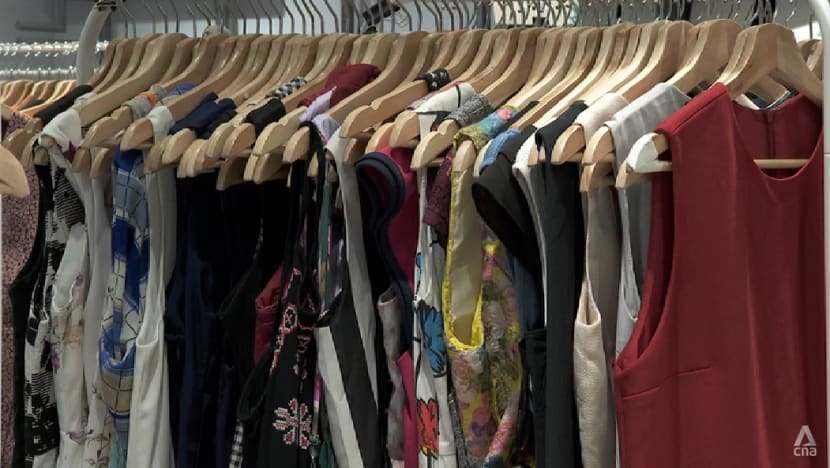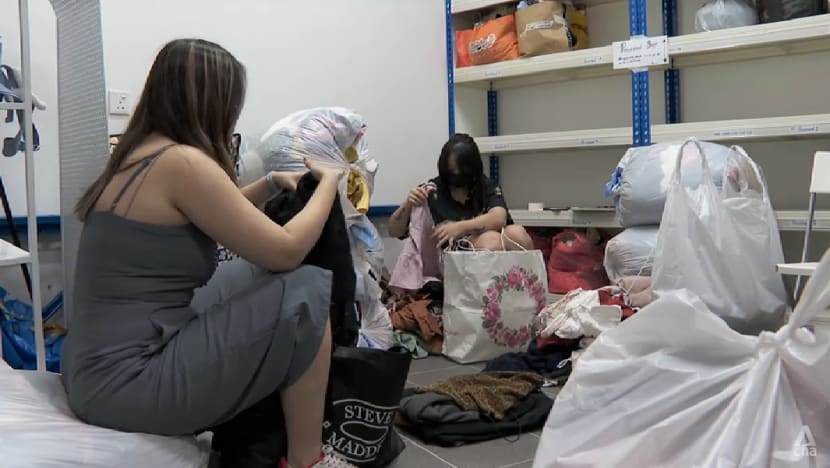Singapore’s limited textile recycling sector drives more interest to resell, export unwanted clothes
The country does not have enough infrastructure or facilities to support a large-scale recycling industry, some companies said.

Singapore might be seeing growing interest in recycling, but companies say the country does not have enough infrastructure or facilities to support a large-scale recycling industry.
SINGAPORE: Singapore might be seeing growing interest in recycling, but companies say the country does not have enough infrastructure or facilities to support a large-scale recycling industry.
More recycling firms are relying on reselling used clothes or exporting them instead.
Online thrift store Refash creates a secondary market for used clothes, by buying old clothing from customers and reselling them to give these unwanted textiles a second chance.
They are sorted based on factors such as style, type of material and their condition.
SECONDHAND MARKET GAINING POPULARITY
The company said the secondhand market is gaining in popularity.
“In recent years, we are seeing a change and a shift in the perception of consumers when it comes to buying secondhand (clothes). So at Refash, we try to expand the spectrum of people who are willing to participate in the buying and selling of secondhand (items),” Refash founder and chief executive officer Aloysius Sng.
“One of the good things that we have done is that we make buying secondhand (clothes) extremely enjoyable.
“When you walk into a Refash shop, you will not feel that it is like a secondhand store, and we also make selling very easy. Just stuff all your items into a bag, pass it to us and we will handle the rest.”
Customers today are “more concerned” about how and what they are buying, in terms of the impact it will have on the environment, he added. “So they are also more open towards buying secondhand (clothes).”
During the peak months, it can receive up to 10,000 people dropping off their used clothes. During the off-peak period, the shop can see more than 5,000 sellers bringing their unwanted clothes down monthly.
“The standard of clothes that we receive has improved by leaps and bounds, but there is still a long way to go in terms of educating our sellers and customers on the type of clothes that we want,” Mr Sng told CNA.
“There’s also that misalignment in selling expectations. So one of the big downsides of doing this is that sometimes sellers might treat us as a dumping ground.
“So we get clothes that are torn, there are defective pieces and very visible stains. But this is part and parcel of operating a business like ours.”
The firm is looking to expand their offering to fashion retailers to clear their excess stock and help reduce waste on a larger scale, so they will not end up in the landfills.

“We are also talking about prominent fashion retailers that we can work with, and provide them with that additional sales channel to own that ecosystem, and to get more of their customers to transact secondhand pieces on their own,” said Mr Sng.
EXPORTING UNWANTED TEXTILES
Malaysian-based recycler Life Line Clothing partners with local textile recycling company Cloop to collect unwanted textiles.
Most of what they collect are then exported to Malaysia for sale, recycling or upcycling.
That is partly because Singapore does not have enough supply and demand to justify high investments in effective recycling systems.
“Clothing comes in a very huge amount of varieties and types. Unlike when you farm cotton, (for instance), you're just farming cotton fields, so you get a whole lot of cotton,” said Mr Dale Warren, chief executive officer of Life Line Clothing.
“But when you farm recycled materials you get all sorts of things. Not one material that you can deal with in volume.
“So the economies of scale dealing with it after it has been manufactured is not the same as when it's in a virgin material. So the challenge is to be able to get volume as well. You won't be effective recycling unless you have a lot of it.”
There is a need to raise awareness about recycling and make it convenient for people to do so, added Mr Warren.
“Once people know that it is possible to do and the facilities are there, they will then participate.”
While prospects for a robust textile recycling sector in Singapore may be uncertain, the Singapore Fashion Council said the country can still do its part without heavy investment in costly technology.
It said education can play an important role in changing behaviours such as reducing over-consumption. Labelling requirements can also help streamline the recycling process.


















